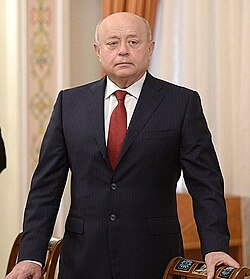Second cabinet of Mikhail Fradkov | |
|---|---|
| 51st Cabinet of Russia | |
 | |
| Date formed | 12 May 2004 |
| Date dissolved | 13 September 2007 |
| People and organisations | |
| Head of state | Vladimir Putin |
| Head of government | Mikhail Fradkov |
| Deputy head of government | Sergei Ivanov Dmitry Medvedev |
| No. of ministers | 22 |
| Member party | United Russia |
| Status in legislature | Majority |
| Opposition party | Communist Party |
| Opposition leader | Gennady Zyuganov |
| History | |
| Predecessor | Fradkov I |
| Successor | Zubkov |
 |
|---|
Mikhail Fradkov's Second Cabinet (May 2004 - September 2007) was the twelfth cabinet of the government of the Russian Federation, preceded by Fradkov's First Cabinet, which followed the cabinet led by Mikhail Kasyanov, who had been dismissed by President Vladimir Putin on February 24, 2004 shortly before the presidential election. It was led by Prime Minister Fradkov, proposed by President Putin for the approval by the State Duma on May 7, 2004, the day Putin entered into his second presidential term. On May 12 Fradkov was approved by the State Duma and appointed Prime Minister by the President. [1] The other 17 ministers of the cabinet were appointed by presidential decrees on May 20, 2004. The prime minister and 16 ministers occupied the same positions in Fradkov's First Cabinet. Only Leonid Reiman assumed the reestablished position of Information Technologies and Telecommunications Minister of Russia. Eight of the ministers took part in Kasyanov's Cabinet, all on the same positions: Yury Chaika, Alexey Gordeyev, German Gref, Sergei Ivanov, Viktor Khristenko, Alexey Kudrin, Leonid Reiman, and Sergei Shoigu.